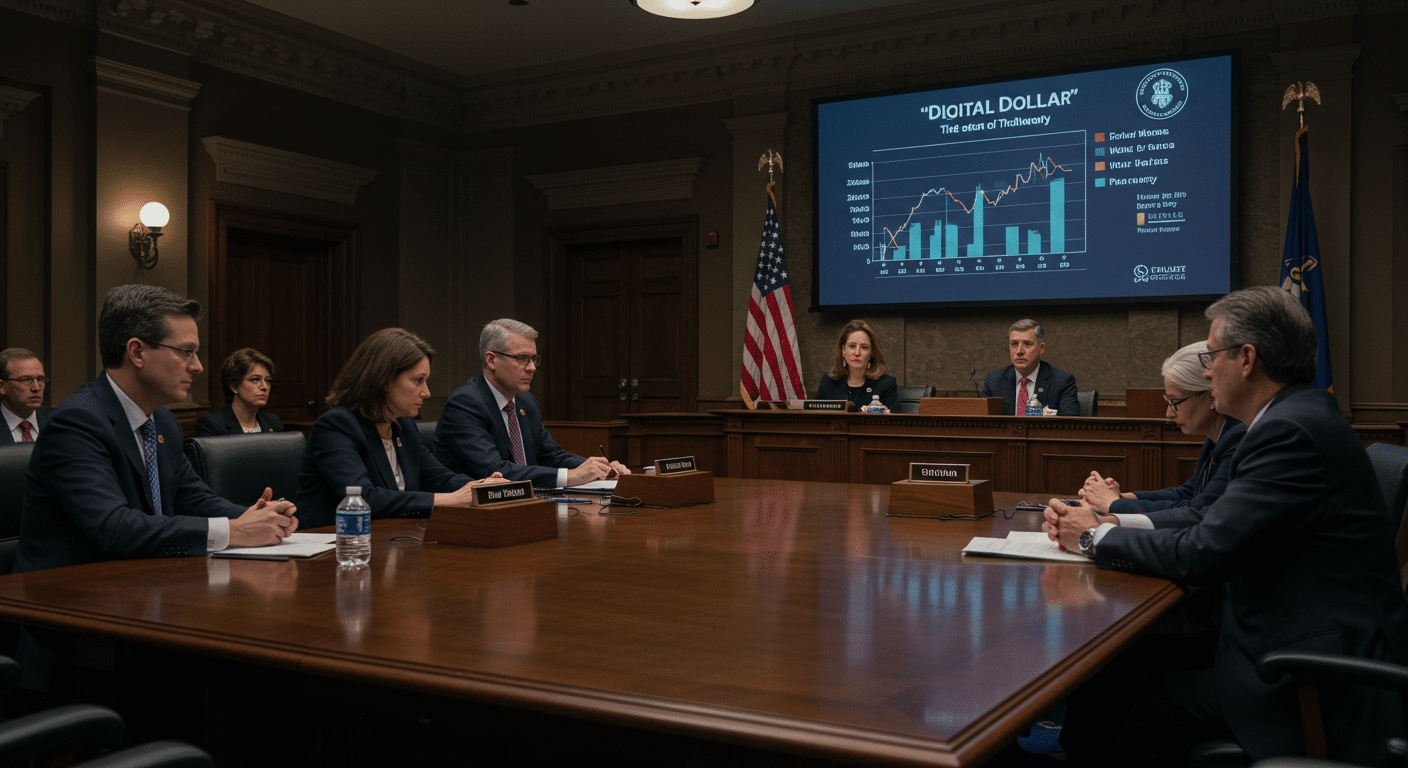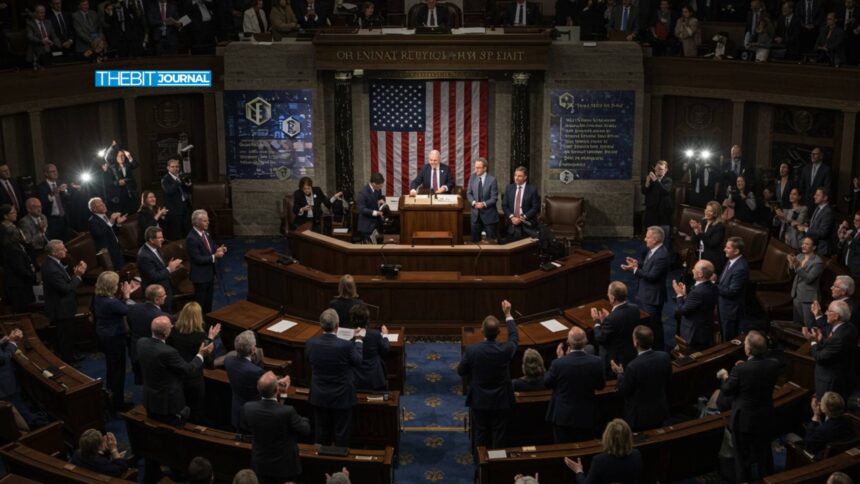The US House of Representatives approved three major crypto bills after a record-breaking ten-hour vote. The procedural motion was approved with a 217-212 vote, which is a significant change in cryptocurrency regulation. The GENIUS Act, the Clarity Act, and the Anti-CBDC Act are now moving forward for further debate and potential legislation.
GENIUS Act Aims to Regulate Stablecoins
The House passed the GENIUS Act to regulate stablecoins and introduce clear rules for their issuance and usage in the US. It describes stablecoins as cryptocurrencies supported by an existing currency, typically the US dollar, to achieve currency stability. The bill details the requirements of the issuers, including the reserves and compliance requirements to secure users and the financial system.

Supporters argue the GENIUS Act fills regulatory gaps in the fast-growing stablecoin market, offering legal certainty for investors and businesses. Nevertheless, applying this technology is also perilous due to misuse, fraud, and other risks of interfering with existing banking systems. In spite of this, the bill gathered momentum as there was significant demand for reliable digital payment systems.
The bill’s evolution represents Congress’s attempt to accommodate digital asset innovation without compromising the integrity of the financial system. The lawmakers stressed the importance of striking a balance between innovations, sustainability, and consumer safeguards. If enacted, the GENIUS Act could become a cornerstone in the broader regulatory framework for digital assets.
Lawmakers Push Clarity Act for Crypto Oversight
The Clarity Act seeks to remove ambiguity by defining digital assets and specifying their treatment under existing US financial laws. Legislators claim that the ambiguity kills innovation and discourages institutional involvement with the crypto industry. The bill will aim to change this by determining whether digital tokens should be classified as securities or commodities depending on their purpose.
JUST IN: 🇺🇸 US House PASSES vote on the motion to advance the GENIUS and CLARITY Acts. pic.twitter.com/oAXMZW1X7v
— Bitcoin Magazine (@BitcoinMagazine) July 16, 2025
Under the Clarity Act, agencies like the SEC and CFTC will have more explicit mandates and defined roles for oversight. This will help curb similar regulations, confusion, and legal ambiguity among companies and startups in the crypto industry. The bill’s intended purpose is merely to promote innovation and provide regulatory compliance within the market.
The industry players enthusiastically welcomed the Act, which was a beacon of legitimacy and investor confidence. One House member said, in debate, that a clear rulebook would help keep down costs and keep the market growing without compromising market integrity. If passed into law, the Act could lay the groundwork for future crypto bills with similar objectives.
Congress Questions Future of Digital Dollar
The Anti-CBDC Act directly targets central bank digital currency (CBDC) proposals, prohibiting the Federal Reserve from launching a digital dollar. Lawmakers backing the bill voiced privacy concerns, fearing that a CBDC could enable government tracking of citizens’ financial activity. They further said that it would undermine the role of the private banks and lessen economic freedom.

The bill outlines specific restrictions, barring the Treasury or Federal Reserve from testing or issuing any form of CBDC. It is an expression of a bigger political position, which holds that digital dollars may impair civil liberties and build up the position of power in federal institutions. The proponents of the legislation noted that, Americans are entitled to privacy in their finances.
While some view CBDCs as tools for payment innovation, the House’s move shows growing skepticism within Congress. The enactments of this bill are an indication that there is much opposition to digitized currency that the government controls. If upheld in the Senate, the measure could halt CBDC development efforts in the US.
Impact of Crypto Bills Could Spur Growth
If these crypto bills are enacted, the crypto industry in the US could experience significant change. The GENIUS Act may encourage institutional interest in stablecoins, potentially boosting innovation and adoption. The Clarity Act could attract businesses seeking regulatory certainty, while the Anti-CBDC Act may prevent government competition with private digital currencies.
Such moves can change the dynamics of the market, pushing the prices of compliant projects up and enticing startups to adopt US regulations. Clear stipulations that will lead to safer investor involvement at all angles may also mitigate the legal risks.
Summary
Based on the latest research, crypto bills passed by the US House represent a significant policy shift toward structured regulation of digital assets. Although the bills’ intended points are in different areas of the crypto world, they have the same purpose: oversight and transparency. Now, Senate discussion and a possible executive action will define their future.
The US House approved three pivotal crypto bills, the GENIUS Act, Clarity Act, and Anti-CBDC Act, after a historic ten-hour vote. These bills aim to regulate stablecoins, clarify digital asset definitions, and block government-issued CBDCs. Their enactment is a milestone in US crypto policy, even though their future within the Senate is still unclear. They may have a significant influence on the digital asset market, which will stimulate expansion and consider more effective regulation.
FAQs
1. What does the US House pass the three crypto bills?
The three crypto bills are the GENIUS Act, the Clarity Act, and the Anti-CBDC Act.
2. What does the GENIUS Act propose?
The GENIUS Act proposes a legal framework for stablecoins, ensuring reserve backing and compliance with financial standards.
3. What is the aim of the Clarity Act?
The Clarity Act aims to define digital assets and assign regulatory responsibilities to federal agencies like the SEC and CFTC.
4. Why was the Anti-CBDC Act introduced?
The Anti-CBDC Act was introduced to prevent the issuance of a US central bank digital currency, citing privacy and surveillance concerns.
5. What happens next with these crypto bills?
The bills move to the Senate for further debate, where they may face amendments, approval, or rejection.
Glossary of Key Terms
- Crypto bills: Legislative proposals aimed at regulating the cryptocurrency industry.
- Stablecoins: Cryptocurrencies designed to maintain a fixed value, often pegged to fiat currencies.
- CBDC (Central Bank Digital Currency): A digital currency issued by a country’s central bank.
- SEC (Securities and Exchange Commission): The federal agency regulating securities markets.
- CFTC (Commodity Futures Trading Commission): The agency overseeing commodities and derivatives markets.
References:





























